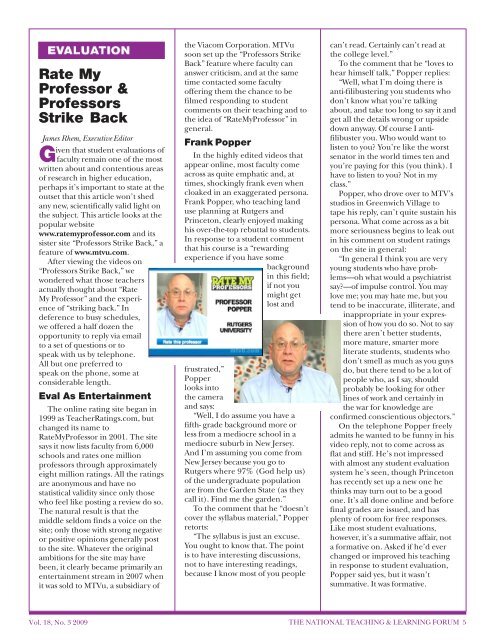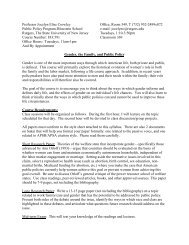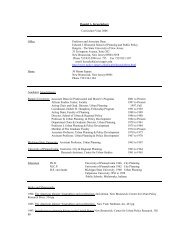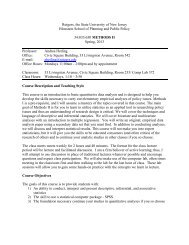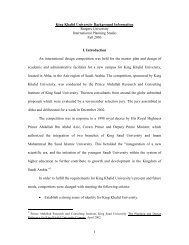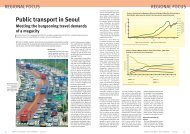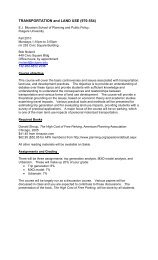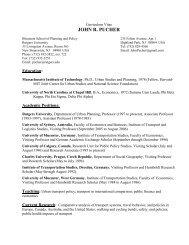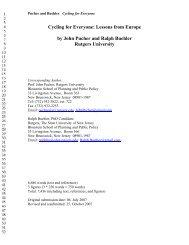Rate My Professor & Professors Strike Back - Bloustein School of ...
Rate My Professor & Professors Strike Back - Bloustein School of ...
Rate My Professor & Professors Strike Back - Bloustein School of ...
You also want an ePaper? Increase the reach of your titles
YUMPU automatically turns print PDFs into web optimized ePapers that Google loves.
<strong>Rate</strong> <strong>My</strong><br />
<strong>Pr<strong>of</strong>essor</strong> &<br />
<strong>Pr<strong>of</strong>essor</strong>s<br />
<strong>Strike</strong> <strong>Back</strong><br />
James Rhem, Executive Editor<br />
Given that student evaluations <strong>of</strong><br />
faculty remain one <strong>of</strong> the most<br />
written about and contentious areas<br />
<strong>of</strong> research in higher education,<br />
perhaps it’s important to state at the<br />
outset that this article won’t shed<br />
any new, scientifically valid light on<br />
the subject. This article looks at the<br />
popular website<br />
www.ratemypr<strong>of</strong>essor.com and its<br />
sister site “<strong>Pr<strong>of</strong>essor</strong>s <strong>Strike</strong> <strong>Back</strong>,” a<br />
feature <strong>of</strong> www.mtvu.com.<br />
After viewing the videos on<br />
“<strong>Pr<strong>of</strong>essor</strong>s <strong>Strike</strong> <strong>Back</strong>,” we<br />
wondered what those teachers<br />
actually thought about “<strong>Rate</strong><br />
<strong>My</strong> <strong>Pr<strong>of</strong>essor</strong>” and the experience<br />
<strong>of</strong> “striking back.” In<br />
deference to busy schedules,<br />
we <strong>of</strong>fered a half dozen the<br />
opportunity to reply via email<br />
to a set <strong>of</strong> questions or to<br />
speak with us by telephone.<br />
All but one preferred to<br />
speak on the phone, some at<br />
considerable length.<br />
Eval As Entertainment<br />
The online rating site began in<br />
1999 as TeacherRatings.com, but<br />
changed its name to<br />
<strong>Rate</strong><strong>My</strong><strong>Pr<strong>of</strong>essor</strong> in 2001. The site<br />
says it now lists faculty from 6,000<br />
schools and rates one million<br />
pr<strong>of</strong>essors through approximately<br />
eight million ratings. All the ratings<br />
are anonymous and have no<br />
statistical validity since only those<br />
who feel like posting a review do so.<br />
The natural result is that the<br />
middle seldom finds a voice on the<br />
site; only those with strong negative<br />
or positive opinions generally post<br />
to the site. Whatever the original<br />
ambitions for the site may have<br />
been, it clearly became primarily an<br />
entertainment stream in 2007 when<br />
it was sold to MTVu, a subsidiary <strong>of</strong><br />
the Viacom Corporation. MTVu<br />
soon set up the “<strong>Pr<strong>of</strong>essor</strong>s <strong>Strike</strong><br />
<strong>Back</strong>” feature where faculty can<br />
answer criticism, and at the same<br />
time contacted some faculty<br />
<strong>of</strong>fering them the chance to be<br />
filmed responding to student<br />
comments on their teaching and to<br />
the idea <strong>of</strong> “<strong>Rate</strong><strong>My</strong><strong>Pr<strong>of</strong>essor</strong>” in<br />
general.<br />
Frank Popper<br />
In the highly edited videos that<br />
appear online, most faculty come<br />
across as quite emphatic and, at<br />
times, shockingly frank even when<br />
cloaked in an exaggerated persona.<br />
Frank Popper, who teaching land<br />
use planning at Rutgers and<br />
Princeton, clearly enjoyed making<br />
his over-the-top rebuttal to students.<br />
In response to a student comment<br />
that his course is a “rewarding<br />
experience if you have some<br />
background<br />
in this field;<br />
if not you<br />
might get<br />
lost and<br />
frustrated,”<br />
Popper<br />
looks into<br />
the camera<br />
and says:<br />
“Well, I do assume you have a<br />
fifth- grade background more or<br />
less from a mediocre school in a<br />
mediocre suburb in New Jersey.<br />
And I’m assuming you come from<br />
New Jersey because you go to<br />
Rutgers where 97% (God help us)<br />
<strong>of</strong> the undergraduate population<br />
are from the Garden State (as they<br />
call it). Find me the garden.”<br />
To the comment that he “doesn’t<br />
cover the syllabus material,” Popper<br />
retorts:<br />
“The syllabus is just an excuse.<br />
You ought to know that. The point<br />
is to have interesting discussions,<br />
not to have interesting readings,<br />
because I know most <strong>of</strong> you people<br />
can’t read. Certainly can’t read at<br />
the college level.”<br />
To the comment that he “loves to<br />
hear himself talk,” Popper replies:<br />
“Well, what I’m doing there is<br />
anti-filibustering you students who<br />
don’t know what you’re talking<br />
about, and take too long to say it and<br />
get all the details wrong or upside<br />
down anyway. Of course I antifilibuster<br />
you. Who would want to<br />
listen to you? You’re like the worst<br />
senator in the world times ten and<br />
you’re paying for this (you think). I<br />
have to listen to you? Not in my<br />
class.”<br />
Popper, who drove over to MTV’s<br />
studios in Greenwich Village to<br />
tape his reply, can’t quite sustain his<br />
persona. What come across as a bit<br />
more seriousness begins to leak out<br />
in his comment on student ratings<br />
on the site in general:<br />
“In general I think you are very<br />
young students who have problems—oh<br />
what would a psychiatrist<br />
say?—<strong>of</strong> impulse control. You may<br />
love me; you may hate me, but you<br />
tend to be inaccurate, illiterate, and<br />
inappropriate in your expression<br />
<strong>of</strong> how you do so. Not to say<br />
there aren’t better students,<br />
more mature, smarter more<br />
literate students, students who<br />
don’t smell as much as you guys<br />
do, but there tend to be a lot <strong>of</strong><br />
people who, as I say, should<br />
probably be looking for other<br />
lines <strong>of</strong> work and certainly in<br />
the war for knowledge are<br />
confirmed conscientious objectors.”<br />
On the telephone Popper freely<br />
admits he wanted to be funny in his<br />
video reply, not to come across as<br />
flat and stiff. He’s not impressed<br />
with almost any student evaluation<br />
system he’s seen, though Princeton<br />
has recently set up a new one he<br />
thinks may turn out to be a good<br />
one. It’s all done online and before<br />
final grades are issued, and has<br />
plenty <strong>of</strong> room for free responses.<br />
Like most student evaluations,<br />
however, it’s a summative affair, not<br />
a formative on. Asked if he’d ever<br />
changed or improved his teaching<br />
in response to student evaluation,<br />
Popper said yes, but it wasn’t<br />
summative. It was formative.<br />
Vol. 18, No. 3 2009 THE NATIONAL TEACHING & LEARNING FORUM 5
“A student at Princeton emailed me<br />
a very thoughtful critique <strong>of</strong> some<br />
things I was doing in class that he<br />
thought I might do differently, and,<br />
when I thought about it, I agreed<br />
with what he said and changed what<br />
I was doing.”<br />
Popper feels more<br />
sympathetic to what he sees<br />
as the potential <strong>of</strong><br />
<strong>Rate</strong><strong>My</strong><strong>Pr<strong>of</strong>essor</strong> than many.<br />
“I think RMP is on to<br />
something that could be<br />
very useful in getting<br />
dialogue about teaching<br />
going,” he says. “Certainly, it<br />
could be a way <strong>of</strong> letting<br />
students know a bit more about<br />
pr<strong>of</strong>essors.”<br />
Phoebe Gloeckner<br />
How students smell comes up in<br />
Phoebe Gloeckner’s video as well.<br />
As with Popper’s, Gloeckner’s<br />
“strike back” seems a mixture <strong>of</strong><br />
having fun with the experience and<br />
expressing some frank truths. For<br />
example, in response to the student<br />
comment that “from day one she<br />
gave <strong>of</strong>f the impression that she<br />
didn’t want to be there,” Gloeckner<br />
replies:<br />
“That makes me sad . . . for you.<br />
You know, it could have been true.<br />
I’m sorry that it was so obvious to<br />
you because teachers are like<br />
anyone else, like a parent. Sometimes<br />
you could almost say that you<br />
hate your kid. You wish you didn’t<br />
have to change another diaper or<br />
try to make them go to bed. It’s<br />
really true. You’d rather be anywhere<br />
but there at that moment.<br />
And that’s how I feel about teaching.<br />
I <strong>of</strong>ten feel like I just want to<br />
throw everything down and run out<br />
<strong>of</strong> the room screaming, but I stay<br />
there. Why? Because in general I do<br />
enjoy teaching you.”<br />
Gloeckner teaches art at the<br />
University <strong>of</strong> Michigan. She’s a<br />
prominent graphic novelist and a<br />
Guggenheim Fellowship winner<br />
whose A Child’s Life and Other Stories<br />
and The Diary <strong>of</strong> a Teenage Girl: An<br />
Account in Words and Pictures have<br />
been controversial owing to their<br />
biologically frank depiction <strong>of</strong> sex.<br />
(Gloeckner was trained as a medical<br />
illustrator.) On the telephone she<br />
elaborated on her response to<br />
students’ frustration with her<br />
teaching. “There are two ways to<br />
teach when it comes to art,” she says.<br />
“One focuses on skills, the techniques<br />
involved; the other has to do<br />
with getting<br />
students to open<br />
up to whatever<br />
artistic vision they<br />
may have. That’s<br />
hard to<br />
teach, if<br />
it can<br />
be<br />
taught at all, and it’s even harder to<br />
assess.” But the latter is the path<br />
Gloeckner follows. She refuses to<br />
teach the ins and outs <strong>of</strong> whatever<br />
graphic s<strong>of</strong>tware is current because<br />
she says, “that stuff is always changing,”<br />
and students have to learn to<br />
learn it for themselves. “Artists have<br />
to learn to teach themselves a lot <strong>of</strong><br />
things,” she says. But the “tough<br />
love” has frustrated her students<br />
and on <strong>Rate</strong><strong>My</strong><strong>Pr<strong>of</strong>essor</strong> some have<br />
complained at her refusal to act the<br />
part <strong>of</strong> an authority figure. To that<br />
in her video she responded:<br />
“It’s true. I don’t want to give you<br />
a grade. I don’t give a <br />
about your grade. And I get tired<br />
when you keep asking me, ‘How<br />
much is this worth?’ and ‘What is my<br />
grade?’ because<br />
what<br />
does it matter??<br />
“Grades are<br />
not everything<br />
and I’m a living<br />
example <strong>of</strong><br />
that. In high<br />
school my average was a D. I did<br />
fairly well on those standardized<br />
tests, and I got into college. I<br />
did not earn a bachelor’s degree,<br />
but I did get a Master’s degree. And<br />
here I am now: I’m your pr<strong>of</strong>essor at<br />
a major university, the University <strong>of</strong><br />
Michigan, and I practically dropped<br />
out <strong>of</strong> high school. I don’t care<br />
about grades.”<br />
Like Popper, Gloeckner finds a<br />
value in students and teachers<br />
being free to express hard truths<br />
about how they feel about each<br />
other or at least the roles and<br />
positions they find themselves in. In<br />
the video she concludes: “Sometimes<br />
we wish we could say ‘This<br />
student is a real ass. They<br />
don’t smell good. I can’t understand<br />
a damn thing they’re saying<br />
and they are not college material.’<br />
And we can’t say that, okay? . . . I<br />
kind <strong>of</strong> envy you students, because<br />
if I could, I’d say the type <strong>of</strong> things<br />
you’re saying about me, I’d say it<br />
about you too. And I think it’s all in<br />
the interest <strong>of</strong> truth and personal<br />
growth. Sometimes I think it’s<br />
important to know those things or at<br />
least to acknowledge them.”<br />
Despite its many shortcomings,<br />
Gloeckner does say that student<br />
feedback has caused her to reflect<br />
on changing her teaching in at least<br />
one respect. In response to their<br />
frustrations with her refusal to be an<br />
authority figure about s<strong>of</strong>tware and<br />
other matters she thinks they need<br />
to learn for themselves, she now<br />
recognizes the need to be more<br />
explicit and open with students<br />
about her reasons.<br />
Natalie Jeremijenko<br />
In addition to giving students<br />
places to rate their pr<strong>of</strong>essors on<br />
Easiness, Helpfulness, and Clarity,<br />
<strong>Rate</strong><strong>My</strong><strong>Pr<strong>of</strong>essor</strong> also allows students<br />
to describe their teachers as<br />
“hot” or not. Natalie Jeremijenko,<br />
who teaches art, engineering, and<br />
robotics at New York University got a<br />
“hot” rating from<br />
a student who<br />
wrote, “I find you<br />
magnetic and<br />
attractive; I want<br />
to be your slave. I<br />
will be your<br />
soldier boy.” In<br />
her video<br />
Jeremijenko replied, “Thank you,<br />
Solider Boy. I think that was a<br />
strange compliment, although I’m<br />
not into slaves, and I’m interested<br />
in working with research assistants<br />
but I’m afraid you’re disqualified<br />
6 THE NATIONAL TEACHING & LEARNING FORUM Vol. 18, No. 3 2009
ecause your motivation is not the<br />
correct one. Sorry.”<br />
Jeremijenko has a low opinion <strong>of</strong><br />
almost every student evaluation<br />
system she’s seen. None <strong>of</strong> them,<br />
she says, get at the heart <strong>of</strong> what<br />
good teaching is all about—student<br />
learning. She still feels disbelief<br />
and annoyance at the comments she<br />
received on evaluation forms when<br />
she taught at Yale about her clothes<br />
and how long it took her to set up a<br />
projector. She believes the best<br />
evaluation <strong>of</strong> teaching lies in<br />
looking at students’ work, what they<br />
can do as a result <strong>of</strong> taking a course.<br />
She believes strongly in the value <strong>of</strong><br />
social networking, which is why she<br />
agreed to make a video (though has<br />
since asked that it be taken down).<br />
If you want to evaluate her teaching,<br />
she says, look at websites like<br />
howstuffismade.org and<br />
environmentalhealthclinic.net,<br />
websites reflecting her students<br />
original work. “Some <strong>of</strong> them<br />
continue to contribute to these<br />
projects years after they’ve completed<br />
the course,” she reports.<br />
“They’ve actually learned something,<br />
and they are still learning.”<br />
Soldier Boy’s reaction notwithstanding,<br />
Jeremijenko’s “tough<br />
love” approach to teaching has<br />
caused some students to accuse her<br />
<strong>of</strong> being “too preoccupied with her<br />
own projects” or perhaps “scatterbrained.”<br />
She pulls no punches in<br />
responding to this kind <strong>of</strong> comment:<br />
“I am not your mother, not your<br />
high school teacher, not responsible<br />
for you organizing your<br />
readings and getting your assignments<br />
and downloading them <strong>of</strong>f<br />
the web or figuring out how to<br />
upload them. I’m sorry. I’m not that<br />
interested and it’s not a good use <strong>of</strong><br />
my time.<br />
“To the idea that I’m scatterbrained:<br />
I have a shield <strong>of</strong> business<br />
that I actually erect to mitigate<br />
students approaching me and<br />
thinking that I have a long time to<br />
talk about their particular problems<br />
or medical certificates, etc. So, it’s a<br />
shield I use instead <strong>of</strong> being rude.”<br />
There may be value, as Frank<br />
Popper and Phoebe Gloeckner<br />
suggest, in students and faculty<br />
having a way to speak frankly about<br />
each other. The real problem with<br />
student ratings seems to arise out <strong>of</strong><br />
their one-size-fits-all design and the<br />
uses to which others outside <strong>of</strong> the<br />
dialogue between students and<br />
their teachers put these generic<br />
ratings.<br />
Anna Gemrich<br />
“What bugs me about rankings,”<br />
says Anna Gemrich, who teaches<br />
Spanish at the University <strong>of</strong> Wisconsin-Madison,<br />
“are the things that<br />
cannot be included in the postings<br />
because the students don’t know or<br />
don’t understand, details like:<br />
1) the course design for Spanish<br />
325 is for a lower skilled student<br />
who has not studied abroad yet and<br />
needs the basic practice 2) I<br />
include LOTS <strong>of</strong> homework to try to<br />
shake the students who are too<br />
advanced for the course (kill them<br />
with tedium) and even with this<br />
3) Spanish 325 has become the goto<br />
course for students fresh <strong>of</strong>f study<br />
abroad who don’t want to lose their<br />
Spanish and have senior standing<br />
(and <strong>of</strong> course they get dibs on<br />
registration times and occupy all<br />
the slots <strong>of</strong> the students for whom<br />
the course is intended—i.e., lower<br />
classpersons) 4) also <strong>of</strong>ten many <strong>of</strong><br />
the students who end up in the<br />
course have good fluency but<br />
horribly poor accuracy in the<br />
language and they are required to<br />
do exercises to remove what we call<br />
“fossilized errors” but they see<br />
themselves as “advanced” language<br />
students who do not need such<br />
remedial work (and they still get it<br />
wrong again and again on the tests)<br />
5) native Spanish speakers sign up<br />
for this class too because they need<br />
the class for the Spanish major and<br />
what native speaker who lived in<br />
his/her home country until 18<br />
needs a conversation class???”<br />
Andrew Tomasello<br />
Highly imperfect and <strong>of</strong>ten<br />
hurtful as they are (who doesn’t<br />
remember the one hateful comment<br />
out <strong>of</strong> dozens <strong>of</strong> positive<br />
ones?), summative student evaluations<br />
are seemingly here to stay.<br />
Teachers concerned with improving<br />
their teaching find little value in<br />
them. Instead many<br />
concerned faculty have<br />
begun composing their<br />
own evaluative surveys<br />
tailored to their courses<br />
and questions about<br />
their particular teaching<br />
approaches. You<br />
might not guess it from<br />
Andrew Tomasello’s<br />
video famous for his<br />
liberal use <strong>of</strong> the “fbomb”<br />
in responding to<br />
students, but Tomasello,<br />
who teaches music at<br />
Baruch College, takes<br />
student feedback very<br />
seriously. To help him improve his<br />
courses he administers an online<br />
survey via zoomerang.com, a selfdesigned<br />
survey he creates for each<br />
course. “The college ratings<br />
summaries are too general,” he says.<br />
“Am I organized? I’m organized.<br />
I’ve been doing this for 27 years; <strong>of</strong><br />
course I’m organized.”<br />
Things like the feedback on<br />
<strong>Rate</strong><strong>My</strong><strong>Pr<strong>of</strong>essor</strong> aren’t helpful<br />
either. Tomasello took some heat<br />
for his video, though he laughs<br />
about it now. “[With those f-bombs]<br />
I was channeling my inner Joe<br />
Pesci,” he says. “I’m a narcissist, an<br />
old rock guitarist who’s now a<br />
medievalist. What can I say?”<br />
For a serious review <strong>of</strong> the research<br />
literature on student ratings see: “Faculty<br />
Evaluation” by Michael Theall at http://<br />
www.ntlf.com/pod/, part <strong>of</strong> the NTLF/<br />
POD online resource library.<br />
Vol. 18, No. 3 2009 THE NATIONAL TEACHING & LEARNING FORUM 7


